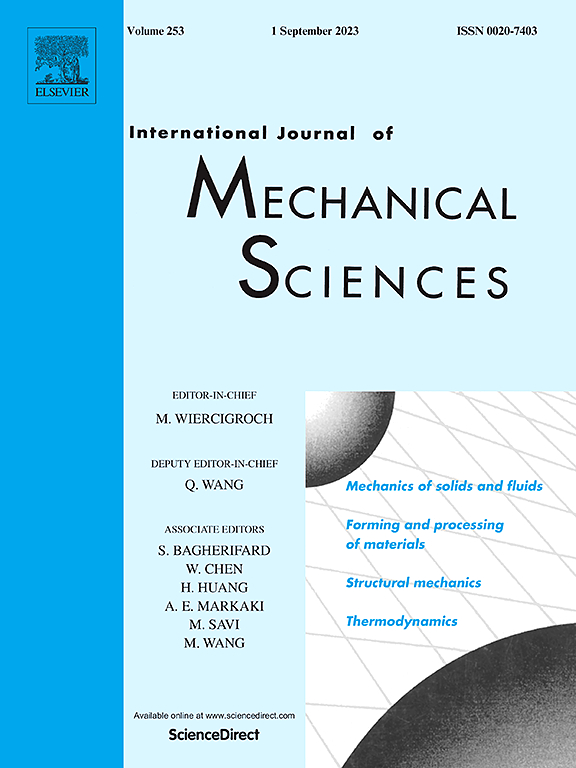Finite torsion of transversely isotropic compressible hyperelastic circular cylinders
IF 7.1
1区 工程技术
Q1 ENGINEERING, MECHANICAL
International Journal of Mechanical Sciences
Pub Date : 2025-07-15
DOI:10.1016/j.ijmecsci.2025.110582
引用次数: 0
Abstract
The paper develops an analytical formulation able to study the finite torsion problem for circular cylinders made of transversely isotropic compressible material. To this end, a three-dimensional displacement field is introduced a priori to take into account the large twisting of a cylindrical body, including both a variation of length in the longitudinal direction and a radial constant contraction. A transversely isotropic hyperelastic material is obtained by combining the stored energy function that characterizes the Mooney–Rivlin model for compressible and isotropic constituents with the standard reinforcing model as far as the anisotropic part is concerned. The nonlinear analyses are carried out analytically in both Lagrangian and Eulerian frameworks aiming at the evaluation of the corresponding stress components, which are respectively included in the Piola–Kirchhoff and Cauchy tensors, once the kinematic unknowns are computed. The problems of free torsion and restrained torsion are considered to investigate the mechanical behavior of the hyperelastic bodies in terms of twisting moment and axial response (force or longitudinal displacement, depending on the boundary conditions). Finally, the influence of the transverse isotropy on the stresses is discussed.横向各向同性可压缩超弹性圆柱的有限扭转
本文提出了一个可用于研究横向各向同性可压缩材料圆柱有限扭转问题的解析公式。为此,先验地引入三维位移场来考虑圆柱体的大扭转,包括纵向长度变化和径向恒定收缩。将可压缩和各向同性组分的Mooney-Rivlin模型的储能函数与各向异性部分的标准增强模型相结合,得到了横向各向同性超弹性材料。非线性分析是在拉格朗日框架和欧拉框架下进行的,目的是评估相应的应力分量,这些应力分量分别包含在Piola-Kirchhoff和Cauchy张量中,一旦计算了运动学未知数。考虑了自由扭转和约束扭转问题,研究了超弹性体在扭转力矩和轴向响应(力或纵向位移,取决于边界条件)方面的力学行为。最后讨论了横向各向同性对应力的影响。
本文章由计算机程序翻译,如有差异,请以英文原文为准。
求助全文
约1分钟内获得全文
求助全文
来源期刊

International Journal of Mechanical Sciences
工程技术-工程:机械
CiteScore
12.80
自引率
17.80%
发文量
769
审稿时长
19 days
期刊介绍:
The International Journal of Mechanical Sciences (IJMS) serves as a global platform for the publication and dissemination of original research that contributes to a deeper scientific understanding of the fundamental disciplines within mechanical, civil, and material engineering.
The primary focus of IJMS is to showcase innovative and ground-breaking work that utilizes analytical and computational modeling techniques, such as Finite Element Method (FEM), Boundary Element Method (BEM), and mesh-free methods, among others. These modeling methods are applied to diverse fields including rigid-body mechanics (e.g., dynamics, vibration, stability), structural mechanics, metal forming, advanced materials (e.g., metals, composites, cellular, smart) behavior and applications, impact mechanics, strain localization, and other nonlinear effects (e.g., large deflections, plasticity, fracture).
Additionally, IJMS covers the realms of fluid mechanics (both external and internal flows), tribology, thermodynamics, and materials processing. These subjects collectively form the core of the journal's content.
In summary, IJMS provides a prestigious platform for researchers to present their original contributions, shedding light on analytical and computational modeling methods in various areas of mechanical engineering, as well as exploring the behavior and application of advanced materials, fluid mechanics, thermodynamics, and materials processing.
 求助内容:
求助内容: 应助结果提醒方式:
应助结果提醒方式:


